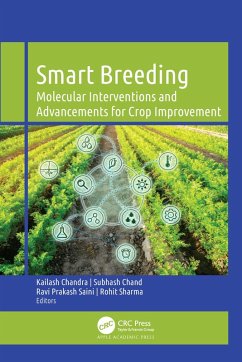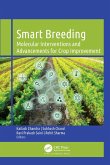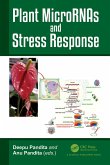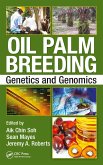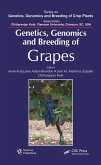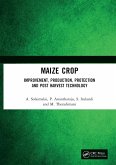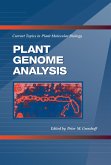Smart Breeding (eBook, PDF)
Molecular Interventions and Advancements for Crop Improvement
Redaktion: Chandra, Kailash; Sharma, Rohit; Saini, Ravi Prakash; Chand, Subhash


Alle Infos zum eBook verschenken

Smart Breeding (eBook, PDF)
Molecular Interventions and Advancements for Crop Improvement
Redaktion: Chandra, Kailash; Sharma, Rohit; Saini, Ravi Prakash; Chand, Subhash
- Format: PDF
- Merkliste
- Auf die Merkliste
- Bewerten Bewerten
- Teilen
- Produkt teilen
- Produkterinnerung
- Produkterinnerung

Hier können Sie sich einloggen

Bitte loggen Sie sich zunächst in Ihr Kundenkonto ein oder registrieren Sie sich bei bücher.de, um das eBook-Abo tolino select nutzen zu können.
Focuses on novel breeding and biotechnological approaches for crop improvement, covering advances in molecular breeding and plant breeding, such as pre-breeding, reverse breeding, allele mining, next-generation sequencing, etc., to develop climate-resilient crops that can withstand hostility or adversities of climate.
- Geräte: PC
- ohne Kopierschutz
- eBook Hilfe
- Größe: 19.99MB
![Smart Breeding (eBook, ePUB) Smart Breeding (eBook, ePUB)]() Smart Breeding (eBook, ePUB)124,95 €
Smart Breeding (eBook, ePUB)124,95 €![Plant MicroRNAs and Stress Response (eBook, PDF) Plant MicroRNAs and Stress Response (eBook, PDF)]() Plant MicroRNAs and Stress Response (eBook, PDF)50,95 €
Plant MicroRNAs and Stress Response (eBook, PDF)50,95 €![Oil Palm Breeding (eBook, PDF) Oil Palm Breeding (eBook, PDF)]() Oil Palm Breeding (eBook, PDF)46,95 €
Oil Palm Breeding (eBook, PDF)46,95 €![Genetics, Genomics, and Breeding of Grapes (eBook, PDF) Genetics, Genomics, and Breeding of Grapes (eBook, PDF)]() Genetics, Genomics, and Breeding of Grapes (eBook, PDF)186,95 €
Genetics, Genomics, and Breeding of Grapes (eBook, PDF)186,95 €![Maize Crop (eBook, PDF) Maize Crop (eBook, PDF)]() A. SolaimalaiMaize Crop (eBook, PDF)151,95 €
A. SolaimalaiMaize Crop (eBook, PDF)151,95 €![Genetics, Genomics and Breeding of Potato (eBook, PDF) Genetics, Genomics and Breeding of Potato (eBook, PDF)]() Genetics, Genomics and Breeding of Potato (eBook, PDF)72,95 €
Genetics, Genomics and Breeding of Potato (eBook, PDF)72,95 €![Plant Genome Analysis (eBook, PDF) Plant Genome Analysis (eBook, PDF)]() Peter M. GresshoffPlant Genome Analysis (eBook, PDF)231,95 €
Peter M. GresshoffPlant Genome Analysis (eBook, PDF)231,95 €-
-
-
Dieser Download kann aus rechtlichen Gründen nur mit Rechnungsadresse in A, B, BG, CY, CZ, D, DK, EW, E, FIN, F, GR, HR, H, IRL, I, LT, L, LR, M, NL, PL, P, R, S, SLO, SK ausgeliefert werden.
- Produktdetails
- Verlag: Taylor & Francis
- Seitenzahl: 446
- Erscheinungstermin: 13. Februar 2024
- Englisch
- ISBN-13: 9781000825657
- Artikelnr.: 69739089
- Verlag: Taylor & Francis
- Seitenzahl: 446
- Erscheinungstermin: 13. Februar 2024
- Englisch
- ISBN-13: 9781000825657
- Artikelnr.: 69739089
QTL Mapping: Principle, Approaches, and Applications in Crop Improvement 3.
Use of Cutting-Edge Technologies for Pulse Crops Improvement 4. Harnessing
Genome Editing Approaches in Crop Improvement to Reshape Modern Agriculture
5. Towards Smart Plant Breeding: Genome Editing Tools for Efficient
Manipulation of Economically Important Traits of Crop Species 6. Smart
Breeding for Climate Resilient Agriculture 7. Reverse Breeding: A Novel
Tool for Crop Improvement 8. Pre-Breeding to Molecular Breeding for Biotic
Stress Management in Crop Plants 9. Perspectives of MutMap and Its Variants
Towards Next Generation Plant Breeding 10. Allele Mining: Potential Tool
for Accelerated Crop Breeding 11. Marker-Assisted Selection Approaches for
Abiotic Stress Tolerance in Crop Plants 12. Marker-Assisted Selection
Approaches for Improving Quality Traits 13. Recent Advances in Plant
Breeding for Pulse Improvement 14. Role of Next-Generation Sequencing
Technology in Crop Improvement
QTL Mapping: Principle, Approaches, and Applications in Crop Improvement 3.
Use of Cutting-Edge Technologies for Pulse Crops Improvement 4. Harnessing
Genome Editing Approaches in Crop Improvement to Reshape Modern Agriculture
5. Towards Smart Plant Breeding: Genome Editing Tools for Efficient
Manipulation of Economically Important Traits of Crop Species 6. Smart
Breeding for Climate Resilient Agriculture 7. Reverse Breeding: A Novel
Tool for Crop Improvement 8. Pre-Breeding to Molecular Breeding for Biotic
Stress Management in Crop Plants 9. Perspectives of MutMap and Its Variants
Towards Next Generation Plant Breeding 10. Allele Mining: Potential Tool
for Accelerated Crop Breeding 11. Marker-Assisted Selection Approaches for
Abiotic Stress Tolerance in Crop Plants 12. Marker-Assisted Selection
Approaches for Improving Quality Traits 13. Recent Advances in Plant
Breeding for Pulse Improvement 14. Role of Next-Generation Sequencing
Technology in Crop Improvement
